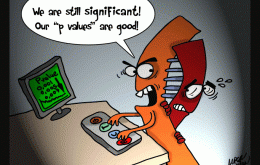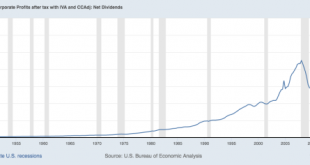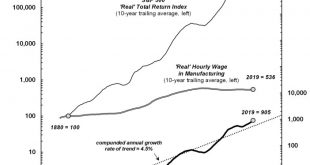Andreas Malm, Fossil Capital: The temporal aspect is particularly striking,’ writes philosopher Stephen Gardiner, who has done perhaps more than anyone to foreground it, in A Perfect Moral Storm: The Ethical Tragedy of Climate Change: it catches us in a bind. Given that global warming is ‘seriously backloaded’ (every moment experiencing a higher temperature posted from the past) and ‘substantially deferred’ (the cumulative effects of current emissions...
Read More »Open thread Aug. 30, 2019
Modern macroeconomics
from Lars Syll There is a purist streak in economics that wants everything to follow from asumming things like ‘rationality’ and ‘equilibrium.’ That purist streak has given birth to a kind ‘deductivist blindness’ of mainstream economics, something that also to a larger extent explains why it contributes to causing economic crises rather than to solving them. But where does this ‘deductivist blindness’ of mainstream economics come from? To answer that question we have to examine the...
Read More »IMF reforms can make things worse: The case of Ecuador
from Mark Weisbrot When people think of the damage that the high-income countries ― typically led by the US and its allies ― cause to people in the rest of the world, they usually think of warfare. Hundreds of thousands of Iraqis lost their lives as a result of the 2003 invasion, and then many more as the region became inflamed. But the rich countries also have considerable power over the lives of billions of people through their control over institutions of global governance. One of...
Read More »Five 38s
This Quinnipiac poll is amazing. It has the delightful feature that all major Democratic candidates are well ahead of Trump, but the really impressive fact is that Trump’s floor and Trump’s ceiling seem to be almost exactly the same — 38% to 40% on Intention to vote for him, and approval on issues other than race (32%) and the economy (46%). Amazingly there are five questions where 38% approve general approval and approval of his handling of foreign...
Read More »China goes generic!
from Dean Baker The New York Times had a piece about a new law in China that reduced penalties for importing drugs that have not been approved by China’s regulatory agency. While it is not clear from the piece how far-reaching this change in the law will be in practice, the potential impact for both China and the world is enormous. India has continued to be a massive supplier of generic drugs, both to its own people, but also to the rest of the world. Many drugs that are subject to patent...
Read More »What — if anything — do p-values test?
from Lars Syll Unless enforced by study design and execution, statistical assumptions usually have no external justification; they may even be quite implausible. As result, one often sees attempts to justify specific assumptions with statistical tests, in the belief that a high p-value or ‘‘nonsignificance’’ licenses the assumption and a low p-value refutes it. Such focused testing is based on a meta-assumption that every other assumption used to derive the p-value is correct, which is a...
Read More »Talk is cheap
from David Ruccio The same day I wrote that capitalism was coming apart at the seams, indicated by the shocking disparity between the compensation of corporate CEOs and workers, the Business Roundtable published its new statement of purpose of a corporation.* The 180 or so corporate executives who signed the statement declared that all their stakeholders, not just owners of equity shares, were important to their mission. Many business pundits, such as Andrew Ross Sorkin, greeted the new...
Read More »Open thread Aug. 27, 2019
Capitalists contra workers
from Shimshon Bichler and Jonathan Nitzan Over the past 139 years, the total return on U.S. equities (capital appreciation plus reinvested dividends) grew 905 times faster than the manufacturing wage rate.
Read More » Heterodox
Heterodox





